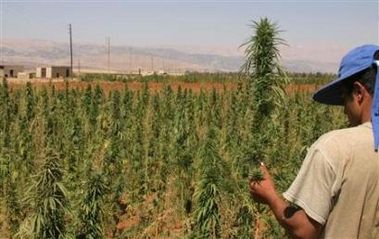 By Tom Perry , BEKAA VALLEY, Lebanon (Reuters) – For a poor Lebanese farmer, the cannabis plant sprouting from the fertile ground of the Bekaa Valley is a blessing from God.For his country, it symbolises the dwindling authority of a state weakened by factional conflict.Surveying a field of the spindly leafed plants, he explained how the government usually sends tractors to destroy the valuable but illegal crop. But this year, they never came, allowing him to reap his first harvest in years.
By Tom Perry , BEKAA VALLEY, Lebanon (Reuters) – For a poor Lebanese farmer, the cannabis plant sprouting from the fertile ground of the Bekaa Valley is a blessing from God.For his country, it symbolises the dwindling authority of a state weakened by factional conflict.Surveying a field of the spindly leafed plants, he explained how the government usually sends tractors to destroy the valuable but illegal crop. But this year, they never came, allowing him to reap his first harvest in years.
"Praise God — he wanted to compensate us," he said, declining to give his name. "It’s been 12 years — farmers have been going backwards, debts have been mounting up."With Lebanon’s government paralysed by political conflict and its army bogged down in a war with militants, farmers have made the most of a security vacuum to grow what locals describe as one of their best cannabis crops since the 1975-1990 civil war.In the chaos of war in the 1980s, Lebanon emerged as the Middle East’s main source of narcotics, producing up to 1,000 tonnes of cannabis resin annually and 30 to 50 tonnes of opium, from which heroin is made, according to the United Nations Office on Drugs and Crime (UNODC).
For Bekaa Valley farmers, those were the good old days, said Ali Hamiyeh, mayor of the village of Tarayah.
"The financial situation was very good. People could do everything, there were no economic restrictions," he said.
"Now things are different."
The end of the civil war and reconstruction of the state spelled the end for large-scale farming of narcotics, which during the conflict had found their way by land and sea to the streets of Europe. The smaller quantities produced since the war are mainly consumed locally, farmers say.
ANYTHING GOES
Lebanese and Syrian security forces eradicated the crops between 1991 and 1993, UNODC says. Unable to make a decent living from wheat or barley, farmers would plant limited areas with cannabis in the hope it would go unnoticed.
"They would farm a bit here, a bit there. This year they farmed a lot," Hamiyeh said.
The farmers were emboldened by a sense the government was losing its grip, weakened by conflict between anti-Syrian factions and others allied to Damascus. The army, meanwhile, was busy fighting Islamist militants in north Lebanon in a bloody battle that dragged on from May to September.
The control Damascus used to exercise over security in the country ended in 2005 when Syrian troops were forced to withdraw.
"Respect for the state has fallen across Lebanon. With the political conditions and divisions, anything goes," Hamiyeh said.
The cannabis crop is sold directly to local producers of hashish, the resin made from the plant which is usually smoked.
"They come, cut the crop and pay," explained the farmer. A cannabis field of 1,000 square metres is worth $1,000 to its owner, against $50 for the same area of wheat, he said.
IGNORED BY STATE
The farmer this year only planted a fraction of the cannabis he used to grow during in the civil war, but said he might sow more next season: "We’ll monitor the situation and see.
"The great thing about cannabis is that it doesn’t need anything. Two kilos of seed cost 10,000 Lebanese pounds ($7)," he said. The plant hardly requires water and can grow without fertilisers or pesticides which add to the cost of other crops.
Farmers have no choice other than to grow cannabis "so that we don’t fall into debt and are forced to sell our land," he said. "The state has turned its back on farmers."
The Ministry of Agriculture admits it has few resources to subsidise cultivation of other crops.
"The budget of the agriculture ministry is very, very limited, meaning the ministry cannot offer anything to these people," said Samir el-Chami, director of planned resources at the ministry. Projects launched in the early 1990s and aimed at finding alternatives to cannabis farming have failed, he said.
Security forces were destroying cannabis crops this season, as in previous years, he said. But farmers would continue to farm the plant as long as it is profitable and there are few alternatives.
"People will keep the view that ‘whenever I get the chance and I can escape the state, I will grow this crop."’



